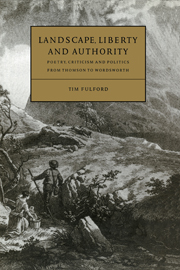Book contents
- Frontmatter
- Contents
- Acknowledgements
- List of abbreviations
- Introduction
- 1 Thomson and Cowper: the ‘stubborn Country tam'd’?
- 2 Johnson: the usurpations of virility
- 3 Unreliable authorities? Squires, tourists and the picturesque
- 4 Wordsworth: the politics of landscape
- 5 Coleridge: fields of liberty
- Index
- CAMBRIDGE STUDIES IN EIGHTEENTH-CENTURY ENGLISH LITERATURE AND THOUGHT
1 - Thomson and Cowper: the ‘stubborn Country tam'd’?
Published online by Cambridge University Press: 14 September 2009
- Frontmatter
- Contents
- Acknowledgements
- List of abbreviations
- Introduction
- 1 Thomson and Cowper: the ‘stubborn Country tam'd’?
- 2 Johnson: the usurpations of virility
- 3 Unreliable authorities? Squires, tourists and the picturesque
- 4 Wordsworth: the politics of landscape
- 5 Coleridge: fields of liberty
- Index
- CAMBRIDGE STUDIES IN EIGHTEENTH-CENTURY ENGLISH LITERATURE AND THOUGHT
Summary
Born in 1700 in Scotland, Thomson came to London in 1725. His poem Winter was published in 1726, followed by poems named after the other seasons. They appeared in one volume, The Seasons, in 1730, incorporating revisions to the original texts. Widely popular for the next one hundred years The Seasons was praised both for its accurate depiction of the details of the rural scene, and for its capacity to lead the reader to moral reflection.
The means by which The Seasons leads the reader will be my subject here, and I shall be examining these means by detailed criticism of particular rural views and incidents narrated by Thomson. I shall be examining them too in the context of the critical arguments about poetry's persuasive power made by Thomson himself and the circle of which he was part, a circle for whom the ideas of John Dennis about the sublime in general and Milton in particular were important. I shall be arguing that, through Dennis's discussion of ‘enthusiastic passion’ in poetry, Thomson developed a discourse on landscape intended, as Dennis argued such poetry should be, to appeal to and renew the taste of gentlemen. Thomson's loco–descriptive verse, I shall contend, formed an ideology the more powerful for its apparent naturalness and the more effective for the contradictions it included.
- Type
- Chapter
- Information
- Landscape, Liberty and AuthorityPoetry, Criticism and Politics from Thomson to Wordsworth, pp. 18 - 72Publisher: Cambridge University PressPrint publication year: 1996
- 1
- Cited by



